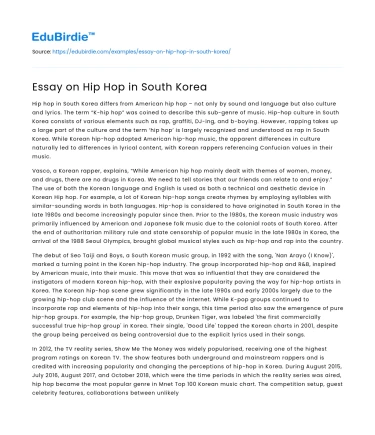Hip hop in South Korea differs from American hip hop – not only by sound and language but also culture and lyrics. The term “K-hip hop” was coined to describe this sub-genre of music. Hip-hop culture in South Korea consists of various elements such as rap, graffiti, DJ-ing, and b-boying. However, rapping takes up a large part of the culture and the term ‘hip hop’ is largely recognized and understood as rap in South Korea. While Korean hip-hop adopted American hip-hop music, the apparent differences in culture naturally led to differences in lyrical content, with Korean rappers referencing Confucian values in their music.
Vasco, a Korean rapper, explains, “While American hip hop mainly dealt with themes of women, money, and drugs, there are no drugs in Korea. We need to tell stories that our friends can relate to and enjoy.” The use of both the Korean language and English is used as both a technical and aesthetic device in Korean Hip hop. For example, a lot of Korean hip-hop songs create rhymes by employing syllables with similar-sounding words in both languages. Hip-hop is considered to have originated in South Korea in the late 1980s and become increasingly popular since then. Prior to the 1980s, the Korean music industry was primarily influenced by American and Japanese folk music due to the colonial roots of South Korea. After the end of authoritarian military rule and state censorship of popular music in the late 1980s in Korea, the arrival of the 1988 Seoul Olympics, brought global musical styles such as hip-hop and rap into the country.
Save your time!
We can take care of your essay
- Proper editing and formatting
- Free revision, title page, and bibliography
- Flexible prices and money-back guarantee
The debut of Seo Taiji and Boys, a South Korean music group, in 1992 with the song, 'Nan Arayo (I Know)', marked a turning point in the Koren hip-hop industry. The group incorporated hip-hop and R&B, inspired by American music, into their music. This move that was so influential that they are considered the instigators of modern Korean hip-hop, with their explosive popularity paving the way for hip-hop artists in Korea. The Korean hip-hop scene grew significantly in the late 1990s and early 2000s largely due to the growing hip-hop club scene and the influence of the internet. While K-pop groups continued to incorporate rap and elements of hip-hop into their songs, this time period also saw the emergence of pure hip-hop groups. For example, the hip-hop group, Drunken Tiger, was labeled 'the first commercially successful true hip-hop group' in Korea. Their single, 'Good Life' topped the Korean charts in 2001, despite the group being perceived as being controversial due to the explicit lyrics used in their songs.
In 2012, the TV reality series, Show Me The Money was widely popularised, receiving one of the highest program ratings on Korean TV. The show features both underground and mainstream rappers and is credited with increasing popularity and changing the perceptions of hip-hop in Korea. During August 2015, July 2016, August 2017, and October 2018, which were the time periods in which the reality series was aired, hip hop became the most popular genre in Mnet Top 100 Korean music chart. The competition setup, guest celebrity features, collaborations between unlikely artists, and new songs available in music stores after each episode appealed to millions of people across the country, with the show becoming a hit, quickly resulting in seasons being produced. In 2015, the show Unpretty Rapstar was released as a spin-off of Show Me the Money, to give female rappers an opportunity in a male-dominated industry.
Another spin-off, called High School Rapper, launched its first season and became a huge success, bringing many young amateur rappers to stardom. Unpretty Rapstar and High School Rapper enabled hip-hop music to become one of the most popular music genres in Korea, especially among the younger generation. Additionally, these TV shows changed the notion and perception of underground and overground hip hop music in Korea at the meso and macro levels. Before the show was aired, hip-hop artists who were signed with major labels and appeared on TV were considered overground rappers while the ones who performed on smaller stages and worked independently were recognized as underground rappers. However, as hip-hop TV shows made hip-hop music mainstream, the underground rappers who were critical of overground rappers gained fame through TV and received the opportunities to work with pop artists and progress their careers. This transition eventually blurred the distinction between underground and overground musicians. The entertainment and music industry in Korea is rapidly changing in large part due to the recent questioning of the larger system by the younger generation of K-pop idol rappers and K hip-hop artists in their rap songs.
This change has facilitated more overlap and intersection between the Korean hip-hop scene and mainstream media, from a collaboration between artists to the promotion of hip-hop in larger entertainment industries. Hip-hop in South Korea overlaps with the K-pop industry, with popular artists such as Seo Taji, big bang, and block b incorporating elements of hip-hop into their music. However, these artists received much criticism from many hip-hop musicians who claimed their music was not “real hip-hop”, and they were commercializing hip-hop music. The main criticism Korean hip-hop artists have of K-pop idol rappers is that they are manufactured and controlled by their companies, they only create music for the money and their image involving makeup, dancing and ‘aegyo’ contrasts with the hip-hop scene. Idol rappers and K hip-hop artists who used to be idols respond to these criticisms in their own raps, emphasizing that, while they are idols, their talent as hip-hop artists should not be disregarded. For example, Kim Namjoon from the K-pop group BTS released an album called RM in 2015, responding to the criticism made by these rappers and claiming that Idol rappers can create authentic rap as well.






 Stuck on your essay?
Stuck on your essay?

